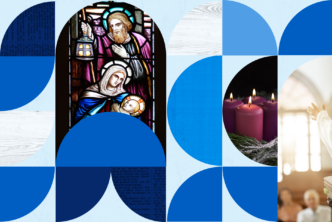Fathers play a critical role in the lives of their children. They are called to be teachers (Prov 1:8; 22:6; Eph 6:4), providers (1 Tim 5:8), disciplinarians (Prov 13:24), and living examples of God (2 Cor 3:2–3). It’s a tall order from the greatest Father of them all.
Though Father’s Day is a great day to teach about fatherhood in the Bible, it’s also the perfect opportunity to connect your congregation with biblical examples of fatherhood everyone can learn from.
Here are four Father’s Day sermon ideas that may spark some ideas.
1. The model of a perfect father
Key passage: Luke 15:11–32
Often, preaching and teaching about the prodigal son focuses on, well, the prodigal son.
But there’s so much more to the story, as Roger Campbell points out in Preach for a Year:
- The father here was chosen to illustrate our heavenly Father
- He had two sons who were prodigals, not just one
- Because the Father was what he was, the prodigal became what he should be
Campbell’s sermon outline explains how the father was approachable, affectionate, loving despite failures, and walked with God—and his son knew it.
The main points
While fathers have a model in Luke 15, there’s more to take away. Every Christian can be comforted because our heavenly Father is as loving and forgiving as the one in Luke 15. Just as he loved and accepted his prodigal son, he will love and accept us when we come to him for forgiveness.
2. A righteous man surrounded by wickedness
Key verse: “But Noah found favor in the eyes of the Lord.” (Gen 6:8)
The story of Noah is one of the most familiar in the Bible. The earth and all the people in it had become corrupt—wickedness had taken over, the earth was “filled with violence,” and the people whom God created were hardened toward him (Gen 6:5, 11)—grieving him to the point that he “regretted that he had made man on the earth” (v. 6).
So, God determined to “make an end of all flesh” and “destroy them with the earth” (vv. 12–13). At God’s command, Noah sets forth to build a ship of a massive capacity according to God’s specifications. He gathered the materials. Built the boat. Loaded the animals. Stocked the ship with food and supplies. Onlookers thought he had lost his mind.
But that’s the flannelgraph version of the story.
There’s a powerful lesson in the story of Noah about the measure of a man (or woman) of God we would do well to pay attention to.
God chose Noah out of all the people of the earth because he knew the condition of Noah’s heart. Tucked away among verses about wickedness and coming destruction, Scripture says that “Noah found favor in the eyes of the Lord” (Gen 6:8). Later in Genesis 7:1, God says he has “seen that [Noah is] righteous before me in this generation.” Noah was just, blameless among the people of his time, and “walked with God” (Gen 6:9). In short, Noah was faithful.
By faith he:
- Trusted in God’s warning of what was ahead
- Protected his family
- Prepared the ark
And because of his obedience, God saved him and seven others (his wife and three sons and their wives). From that small crew, God repopulated the earth.
Centuries later, the writer of Hebrews would highlight Noah’s character: “By faith Noah, when warned about things not yet seen, in holy fear built an ark to save his family. By his faith he condemned the world and became heir of the righteousness that is in keeping with faith” (Heb 11:7).
Noah kept his eyes on God despite the evil and depravity around him. He wasn’t a perfect man, by any means, but he protected his family, remained faithful to his Creator, and carried out what God tasked him to do. Yes, the story of Noah’s ark makes for a fun children’s story—but it carries a profound lesson about how one person’s steadfast faith can impact generations.
The main point
God blesses and protects those who listen to and obey God.
3. An earthly father with a divine task
Key verse: “And her husband Joseph, since he was a righteous man and did not want to disgrace her, planned to send her away secretly.” (Matt 1:19 NASB)
Joseph is known as the committed man betrothed to Mary and father to the child Jesus, who was not biologically his (Matt 1:18). The Bible doesn’t offer much information about Joseph—a few references merely.
But reading between the lines, Joseph possesses a character trait we often miss. Consider what we do know.
i. He obeyed God unswervingly
Several times Joseph received visits from the angel of the Lord in dreams, who instructed him to do something difficult. He’s commanded to stay with Mary, pregnant with a child not his own, and later instructed to flee with her and the child to Egypt. Note his steadfast obedience:
All this took place to fulfill what the Lord had spoken by the prophet: “Behold, the virgin shall conceive and bear a son, and they shall call his name Immanuel” (which means, God with us). When Joseph woke from sleep, he did as the angel of the Lord commanded him: he took his wife, but knew her not until she had given birth to a son. And he called his name Jesus. (Matt 1:22–25, emphasis added)
Now when they had departed, behold, an angel of the Lord appeared to Joseph in a dream and said, “Rise, take the child and his mother, and flee to Egypt, and remain there until I tell you, for Herod is about to search for the child, to destroy him.” And he rose and took the child and his mother by night and departed to Egypt. (Matt 2:13–14, emphasis added)
A few years later (see Matt 1:19), Joseph experienced two more dreams—one letting him know it was safe to leave Egypt (vv. 19–21) and another instructing him where to settle: in the Galilee (v. 22). All four times he obeyed without question.
ii. He was a righteous man—despite facing humiliation among his own people
Though he did not intend to stay with Mary after learning of her pregnancy, his plan to send her away stemmed from a compassionate heart that wanted to protect her. Notice Matthew 1:19 tells us that:
Joseph her husband,1 being a righteous man and not wanting to disgrace her, planned to send her away secretly. (Matt 1:19 NASB)
The CEB translation says Joseph didn’t want to “humiliate” her and so decided to “call off their engagement quietly.” His righteousness was regarding his observance of the law (Deut 22:13–31; see also Luke 1:6), and though there are a few ways this verse could be interpreted, some commentators believe Joseph—as a good Torah-observant Jew—was within his rights to make her a public disgrace. (By law, he could legally divorce her for her “indecency” [Deut 24:1]).
Yet Joseph chose to protect her reputation.
iii. He loved Jesus
Though the Bible never says this directly, consider the familiar story in Luke 2:47–50. Mary and Joseph had started their return home to Nazareth from Jerusalem after Passover but soon realized they had lost track of Jesus. They returned to Jerusalem and found him sitting among the teachers in the temple, listening and asking questions (v. 46). Mary says: “Son, why have you treated us like this? Your father and I have been anxiously searching for you in great distress” (v. 48)—to which Jesus responds: “Didn’t you know I had to be in my Father’s house?” (v. 49).
Jesus corrects Mary and refers to his true Father, a critical point in the story. But we mustn’t miss the deep pain Joseph experienced when he couldn’t find the adopted Son God had entrusted to him.
Though it’s likely Joseph didn’t live long enough to see Jesus’ public ministry (this is the last time the Bible mentions Joseph, and Scripture doesn’t record anything to indicate otherwise), God chose this man of integrity to be the earthly father to his Son, Jesus—a behind-the-scenes yet mountainous task and one that Joseph embraced.
The main point
God honors integrity.
4. A bold father-in-law who gave wise counsel
Key verse: “What you are doing is not good. You and the people with you will certainly wear yourselves out, for the thing is too heavy for you. You are not able to do it alone.” (Exod 18:17–18)
Jethro is one of those characters in the Bible we tend to gloss over—and yet his involvement in his son-in-law’s life and in the life of the nation of Israel—was paramount.
The Israelites were camped below Mount Sinai, sustained on daily portions of quail and manna. Moses’s father-in-law and priest of Midian, Jethro, observed Moses’s non-stop daily activities—judging disputes between his people from morning to night without delegating responsibilities. There were so many disgruntled people that Scripture says “the people stood around Moses from morning till evening” (v. 13). Just imagine the chaos!
Jethro watched all this with concern and asked: “Why are you doing this? Why are you the only judge? And why do people come to you all day?” (v. 14), to which Moses replied, “The people come to me to inquire of God; when they have a dispute, they come to me and I decide between one person and another, and I make them know the statutes of God and his laws” (vv. 15–16).
Moses was headed for burnout, and Jethro couldn’t stand by and watch. He said:
What you are doing is not good. You and the people with you will certainly wear yourselves out, for the thing is too heavy for you. You are not able to do it alone. Now obey my voice; I will give you advice, and God be with you! You shall represent the people before God and bring their cases to God, and you shall warn them about the statutes and the laws, and make them know the way in which they must walk and what they must do.
Moreover, look for able men from all the people, men who fear God, who are trustworthy and hate a bribe, and place such men over the people as chiefs of thousands, of hundreds, of fifties, and of tens. And let them judge the people at all times. Every great matter they shall bring to you, but any small matter they shall decide themselves. So it will be easier for you, and they will bear the burden with you. If you do this, God will direct you, you will be able to endure, and all this people also will go to their place in peace. (Exod 18:17–23)
Now, Moses could have waved his father-in-law off and continued judging between the people, and likely ended up exasperated. But he doesn’t—he humbly listens and acts on Jethro’s wise counsel. The next verse becomes the hinge for what would lead to the “strategy for Israel to govern itself”:2
So Moses listened to the voice of his father-in-law and did all that he had said. (v. 24)
Moses listens to God’s wisdom (mediated through Jethro—an outsider to Israel), chooses wise elders from among the fledgling nation, and establishes them as leaders (or “judges”) over the people. They hear the minor disputes, while Moses decides only the most critical cases—and God’s redemptive work for Israel expanded into the work of justice among his people.
The story of Jethro and Moses is a beautiful example of God’s intention for the body working together, each person using the gifts God has given, as Paul teaches in 1 Corinthians 12. God has “so composed the body, giving greater honor to the part that lacked it, that there may be no division in the body, but that the members may have the same care for one another” (vv. 24–25).
The main point
God gives people different responsibilities as part of the body to protect the individual from burnout and accomplish the work needed for his plan to progress.
Related articles
- Mother’s Day Sermon Ideas: 4 Unusual, Powerful Options
- How to Power Your Sermon Presentation—from the Pulpit
- Sermon Planning Toolkit: The Swiss Army Knife of Sermons
- Plan and Store Sermons All in One Place with Sermon Manager
Further resources

Sermon Outlines for Busy Pastors: Mother’s and Father’s Day Sermons: 11 Complete Sermon Outlines
Regular price: $9.99
- Alan McNeile writes that: “A betrothed girl was a widow if her fiance died and whether the man had ‘taken’ her to his house or not. After betrothal, therefore, but before marriage, the man was legally ‘husband’ (Gen 29:21; Deut 22:23).” He continues, “An informal canceling of betrothal was impossible: the man had to give the woman a writ and pay a fine.” Alan McNeile, The Gospel According to St. Matthew (London: Macmillan and Co., 1928), 7–8.
- John D. Barry, “Jethro,” in Lexham Bible Dictionary (Bellingham, WA: Lexham Press, 2016).








